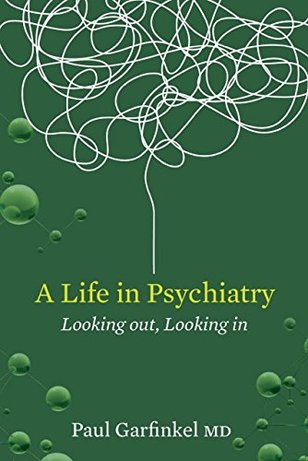
"I think psychiatrists have a harder time dealing with the death of a patient than other specialists, like cardiologists or oncologists, when the death is by suicide. Skilled therapists tend to develop intense, close relationships with their patients. They care deeply about their progress and survival. A therapist may take it upon himself or herself to act as the saviour of a particular patient. This can set the therapist up for a devastating personal loss should the patient choose death over life."
Recommended For:
Anyone with a budding interest in the field of psychiatry, or who is curious to know more about the ins and outs of life in the specialty
When Dr. Paul Garfinkel started his career in psychiatry in the 1970s, psychoanalysis dominated the profession. Then the pendulum swung the other way. Psychoanalysis was discredited and drugs became the treatment of choice for mental illness. Throughout his career, Garfinkel has struggled to find a balance between these two poles, between compassion and human touch on one hand and the rigour of science and the prescribed drugs that have revolutionized psychiatry on the other. Though it was sometimes not popular, he held steadfast to his belief that medicines combined with psychotherapy are often better than either one alone. In this deeply personal memoir Garfinkel writes about his journey through a 40-year career and life devoted the to the understanding, care, and advocacy of the mentally ill. He takes us through the many stages in his life, from his humble beginnings in Winnipeg as the son of Jewish immigrants, through to medical school, his internship at Toronto Western Hospital, his rise to leadership positions at many institutions and eventually as the first CEO of the Centre for Addiction and Mental Health (CAMH). With candour, Garfinkel gives us insights into the life of a psychiatrist and reveals the challenges facing many practitioners, including “burn out” and the intense pain they feel when a patient commits suicide. He probes some of the most controversial subjects in the profession, such as the outrageous sexual abuse of patients. He shares his thoughts on the qualities needed to be a good psychiatrist and a good leader. He reflects honestly on some of his professional missteps and the breakup of his own marriage. Garfinkel passionately urges his colleagues to speak out, support the patients, and work toward removing the stigma of mental illness, hopeful for the day when people with mental illness are treated like anyone else who is suffering and in pain. A Life in Psychiatry is a fascinating insight into the world of mental health care from a devoted and compassionate pioneer (amazon.com).
 RSS Feed
RSS Feed
